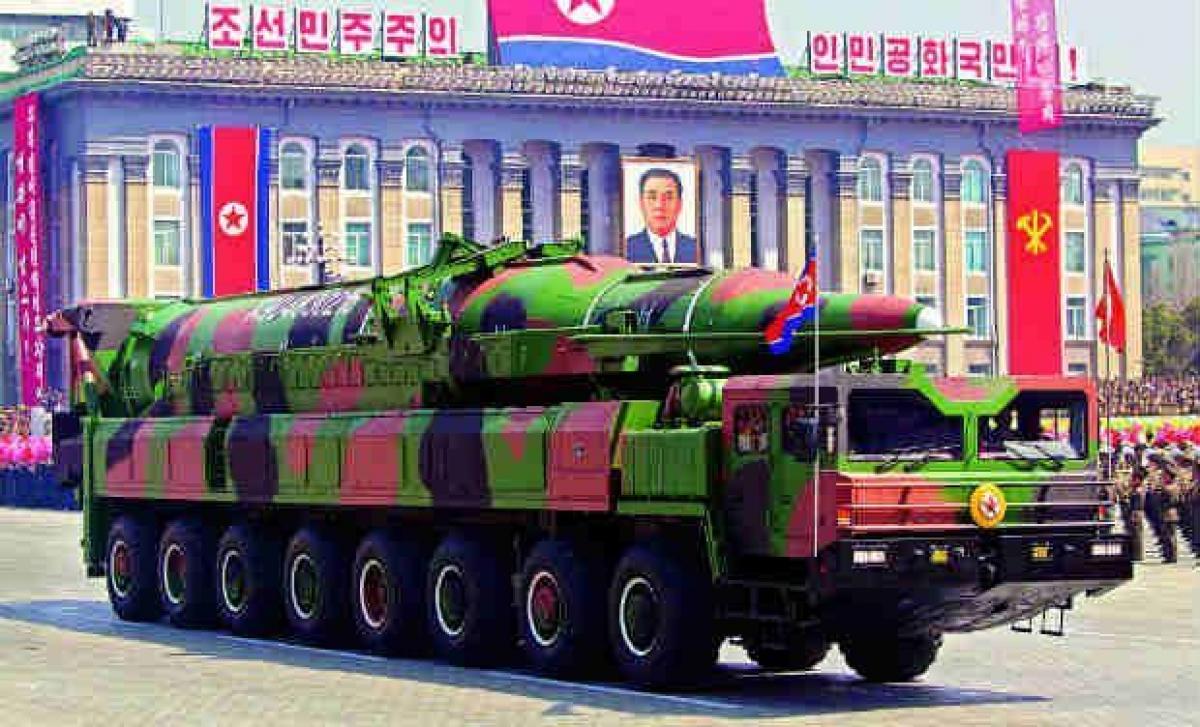Live
- A feast of music, dance and drama
- Mohan Babu denies absconding amid legal controversy
- Swift City to boost industrial growth in Bengaluru
- Allu Arjun walks out free after spending night in jail
- Congress harbours no grudge against any actor: TPCC chief
- Allu Arjun meets Upendra after release from prison, wishes for his ‘UI’ film
- Government Launches Uniform Diet Plan to Boost Student Health and Education
- Robust Security Arrangements for TSPSC Group-2 Exams in Jogulamba Gadwal
- National Lok Adalat Resolves 3387 Cases at Alampur Court
- ‘Get Set, Grow Summit 2024’ Focuses on Digital Detox for Families
Just In

x
Highlights
North Korea on Tuesday confirmed the restarting of a nuclear reactor seen as its main source of weapons-grade plutonium, raising the second red flag in 24 hours over its nuclear and ballistic missile programmes.
North Korea on Tuesday confirmed the restarting of a nuclear reactor seen as its main source of weapons-grade plutonium, raising the second red flag in 24 hours over its nuclear and ballistic missile programmes.

The confirmation, by the head of the North's Atomic Energy Institute (AEI), came hard on the heels of suggestions by the chief of the national space agency of a possible satellite rocket launch next month.
Analysts said the two statements were clearly coordinated and partially aimed at raising tensions to place North Korea firmly on the agenda of an expected US-China summit later this month.
In an interview with the North's official KCNA news agency, the director of the AEI said all facilities at the Yongbyon nuclear complex -- including a five-megawatt reactor -- had "started normal operations".
North Korea mothballed the Yongbyon reactor in 2007 under a six-nation aid-for-disarmament accord, but began renovating it after its last nuclear test in 2013.
When fully operational, the reactor is capable of producing around six kilos (13 pounds) of plutonium a year -- enough for one nuclear bomb, experts say.
'Improved' nuclear deterrent
The AEI director said scientists had been "steadily improving" both the quality and quantity of the North's nuclear deterrent and he issued a by-now standard warning to the United States.
"If the US and other hostile forces persistently seek their reckless hostile policy ... (North Korea) is fully ready to cope with them with nuclear weapons any time," he said.
The warning followed strong hints from Pyongyang that it is considering a satellite rocket launch to mark the 70th anniversary of the founding of the ruling Workers' Party of Korea (WPK) on October 10.
"The world will clearly see a series of satellites soaring into the sky at the times and locations determined by the WPK central committee," the director of the North's National Aerospace Development Administration said late on Monday.
The North insists its rocket launches are intended to put peaceful satellites into orbit. The United States and its allies see them as disguised ballistic missile tests.
North Korea's main diplomatic ally China has protected it from tougher sanctions over its nuclear and missile tests, but is seen as increasingly impatient with its provocative behaviour.
Targeting China-US summit
Some analysts pointed to Chinese President Xi Jinping's scheduled state visit to the United States later this month as a reason for the North's recent statements.
"Pyongyang wants the North Korea issue high on the agenda of Xi's talks with President Obama," said Koh Yu-Hwan, a North Korea expert at Dongguk University in Seoul.
"The North always wants the attention of the global community and knows that flagging its weapons programmes is one way to get it," Koh said.
The North's only successful satellite launch was one using the Unha-3 rocket in December 2012 -- a move that resulted in fresh sanctions and a surge in military tensions that culminated two months later in the North's third nuclear test. South Korea, the United States and Japan all issued a warning on Tuesday that any fresh launch would violate UN resolutions banning the North from using ballistic missile technology.
Urging Pyongyang to refrain from what would be a "serious act of provocation," Seoul said it would not hesitate to press the UN Security Council for "a quick and effective response". At the same time the South's defence ministry stressed that no activity had been observed to suggest a rocket launch was imminent. Recent satellite images show that the North has carried out significant upgrades of facilities at its main Sohae satellite launch station.
Analysts at the US-Korea Institute at Johns Hopkins University believe the Sohae launchpad can now handle rockets up to 50 metres (165 feet) in length -- almost 70 percent longer than the Unha-3 rocket.
The Unha-3 is seen as a prototype intercontinental ballistic missile (ICBM), although the North has yet to conduct a test showing it has mastered the re-entry technology required for an effective ICBM capability. Developing a working ICBM would be seen as a game-changer, bringing the mainland United States within range of a possible nuclear strike.

Next Story
More Stories
ADVERTISEMENT
© 2024 Hyderabad Media House Limited/The Hans India. All rights reserved. Powered by hocalwire.com







